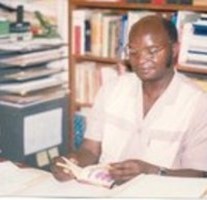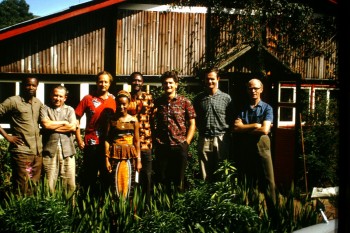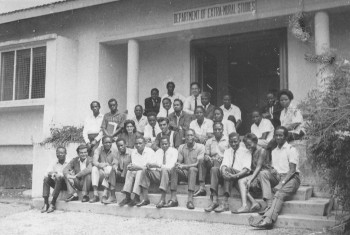Anthony Okech (1943-)
Serving Adult Learners in a long career at Makerere

Anthony Okech, born 24 May 1943, started working with Makerere University in 1971 as the Extra-Mural Resident Tutor (RT) for Arua, West Nile and Madi West region. The Department of Extra-Mural Studies started in 1953 as an outreach arm of the university and opened extra-mural centres in various towns of the country. In the 1970s, it changed name to the Centre for Continuing Education (CCE). He joined a year after Makerere had become an independent university, following the disintegration of the University of East Africa in 1970. A training place for clerks and lower-level workers in the colonial era, Makerere was also an important institution for the preparation of independence leaders: Uganda’s Milton Obote, Kenya’s Jomo Kenyatta, and Tanganyika’s Julius Nyerere. Adult education was important: as expatriate staff left, Makerere prepared adults for the civil service through the Mature-Age Entrance scheme, allowing those with working experience and at least 25 years of age a chance to enrol after passing an entrance exam.
Becoming an adult educator
In a recent interview, Okech described the work of the RT in the following words:
“to take the university to the people; providing university-based learning opportunities to adults who were interested in practically any form of learning... The RT would use his/her own specialization, for example, since one of the finishing languages in my Bachelor’s degree was French, I used to teach French, as demanded in Arua, at the border with Zaire where French was the official language. The RT obtained local resources – professionals to provide learning for adults… if adults wanted to learn about cooperatives, you would get someone from the Cooperative Department or a cooperative union. We organised courses according to demand.”
Organising courses to fulfil learners’ demands was important because it ensured learners’ motivation and commitment.
Training abroad and global connections
Okech’s motivation to join adult education was driven by his interest in academia; being able to analyse and discuss issues. Later, his experience as an RT, helping people learn what, for various reasons, they had not had the opportunity to learn, gave him a new motivation and commitment to helping disadvantaged people learn. With his bachelor’s degree, he had also attended several short courses in adult education: a three months course in the United Kingdom and other short courses at University of Nairobi. He learnt a lot from conferences and much shorter courses which took place when the African Adult Education Association was thriving. There was a lot of sponsorship for short courses. Okech observed:

"the trainings were spread out; starting in 1972 when I spent the three months at a short course in the United Kingdom. Then they continued and intensified in the 1980s. You know in the 70s we had a bit of a challenge because of the Amin regime; Uganda was not so much in the mainstream, so it was not nice"
The trainings and conferences exposed him to the professional discipline of adult education because he met people who had specialised in adult education for a long time: Alan Rogers, Lalage Bown, and Paulo Freire, the Brazilian advocate of critical pedagogy. University adult education in Uganda was thus influenced by global connections, provisions and understandings because of the collaborations, trainings, conferences and publications with the adult educators from other parts of the world.
Achievements and changes at Makerere
In 1974, Okech moved to the Mass Media Unit at Makerere University. Other promotions and achievements included: Senior Tutor and Head of Mass Media Unit, Director of the Centre for Continuing Education and Institute of Adult and Continuing Education (1989-1995), Senior Lecturer, and Head of Department Adult Education and Communication Studies (1995-2001). He enthusiastically welcomed initiatives to reach out with learning opportunities to adults all over the country. Concurrently, he gained a broader view of helping adults learn, eventually engaging with adult learning at the very basic level of adult literacy provision as technical advisor, materials developer and trainer of facilitators. He firmly supported the move for professional training in adult education at the CCE to ensure professional facilitation of adult learning at all levels. As the list below attests, Okech is also highly published.

When the CCE, which was upgraded to the Institute of Adult and Continuing Education (IACE) in 1992, established three departments (Adult Education and Communication Studies, Community Education and Extra-Mural Studies, and Distance Education), he chose to be in the Department of Adult Education and Communication Studies, dedicated to research and training in adult education as a discipline and profession. He played a leading role in developing academic and professional programmes, teaching, supervision of research projects and mentoring several students including the author of this biography. The prominent programs were: The Diploma in Adult Education, Bachelors, and the Masters in Adult and Community Education. He was one of the first senior lecturers and mentors on the Master program when it started in 2006. He coordinated the German Adult Education Association (DVV) collaboration with the Department of Adult Education at Makerere University.
Okech believed that their mission, as first generation adult educators, was to leave behind properly trained adult education professionals and a growing adult education academic discipline at Makerere University. He retired in 2009 and lives with his family in Tororo district in Uganda. He felt that by the time he retired, a good foundation had been laid, despite working conditions that were sometimes challenging.
Primary sources, including Okech's publications
Interview with Anthony Okech, conducted by Priscilla Asiimire, 9 November 2021
Okech, A. (1994). A Report of a study of Innovative Approaches to adult literacy education currently used in Uganda. SNV- The Netherlands Development Organisation, Kampala.
Okech, A., Carr-Hill, R.A., Katahoire, A.R., Kakooza, T., and Ndidde, A.N. (1999). Report of the evaluation of the Functional Adult Literacy Programme in Uganda. Ministry of Gender, Labor and Social Development, Kampala.
Okech, A. (Ed.) (2004). Adult Education in Uganda; Growth, Development, Prospects and Challenges. Fountain.
Okech, A. (2006). Continuing and Extension of literacy programmes: From Literacy to Adult Basic Education and beyond in Uganda. A paper presented at the Biennale on education in Africa, Gabon, 27th - 31st March 2006.
Okech, A., Carr-Hill, R.A., Katahoire, A.R., Kakooza, T., Ndidde, A.N., and Oxenham, J. (2001): Adult Literacy Programs in Uganda, African Region Human Development Series. The World Bank
Atim, D. K., Nsamba, Y. N., and Okech, A. (2004). Fifty years of Makerere University Based Adult Education in Uganda. Institute of Adult and Continuing Education.
Further reading
Chilisa, B. and Preece, J. (2005). Research Methods for Adult Educators in Africa. African Perspectives on Adult Learning Series. UNESCO Institute for Education, Hamburg, Germany, and Pearson Education South Africa.
Mngomezulu, B. R. (2004). A Political History of Higher Education in East Africa: The rise and fall of the University of East Africa, 1937-1970. Rice University.
Motani, A. N. (1979). Makerere College 1922-1940: A Study in Colonial Rule and Educational Retardation. African Affairs, 78(312), 357–369.
Sicherman, C. (2005). Becoming an African University, Makerere 1922-2000. African World Press.
Priscilla Asiimire's PhD is funded by the Gerda Henkel Foundation.


